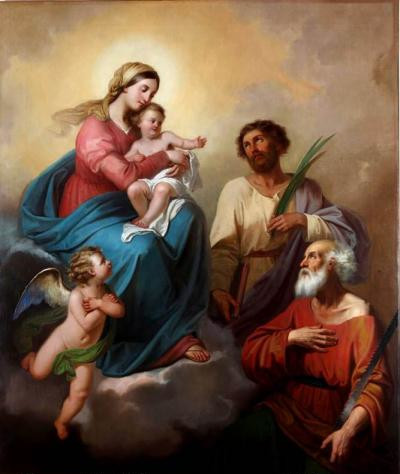
Saint of the Day for 28 October: Saints Simon and Jude
Saints Simon and Jude: the two apostles who were forgotten
Name
Saints Simon and Jude
Title
Apostles
Recurrence
28 October
Martyrology
2004 edition
Prayer
Glorious apostle, St. Judas Thaddeus, who brought the true faith to the farthest nations, who gained many peoples to the obedience of Jesus Christ by the power of your holy word, grant me, I beseech you, that from this day I may renounce all sin, that I may be preserved from all evil thoughts and may always obtain your protection, particularly in every danger and difficulty, and that I may arrive safely at the heavenly homeland, to worship with you the Most Holy Trinity, the Father, the Son and the Holy Spirit, for ever and ever. Amen.
Patron saint of
Marostica, Sovico, Cartigliano, Nibionno, Cornegliano Laudense, Rodero, Nogarole Vicentino, Corna Imagna, Radicondoli, Ricaldone
Roman Martyrology
Feast of Saints Simon and Jude, Apostles: the first was surnamed Canaanite or Zealot, and the other, also called Thaddeus, son of James, at the Last Supper questioned the Lord about his manifestation, and he answered, “If anyone loves me, he will keep my word, and my Father will love him, and we will come to him and make our abode with him.”
The Saint and Mission
Simon and Judas, apostles and martyrs, shared a story deeply intertwined with the mission of spreading the Gospel of Christ. Their experience represents an extraordinary journey through which the Word of God crossed borders and touched hearts, showing the transformative power of faith.
Simon, known as the Zealot, testifies to the burning fire of conversion and dedication. His initial fervor for law and tradition is transformed into an unwavering passion for the proclamation of the risen Christ. His life becomes an eloquent example of how an encounter with Jesus can radically transform, prompting one to overcome one’s certainties to embrace a greater mission.
Judas, also known as Thaddeus, embodies the most intimate and consoling aspect of mission. He is dedicated to bringing hope and comfort, to witnessing to God’s loving presence even in the most difficult situations. His figure reflects the gentleness with which God’s Word enters lives, healing wounds and renewing hope.
Together, Simon and Judas represent the tireless commitment and courage to proclaim the Gospel to the ends of the known world. Their mission takes place in often hostile and dangerous contexts, but their unwavering faith and total dedication testify to the power of the message they carry.
Their lives and martyrdom show us that Christian mission is never an easy or obstacle-free path. It requires sacrifice, courage and a total trust in the transformative power of God’s love. Simon and Judas teach us that mission is not so much a matter of grand gestures or eloquent words, but rather of daily faithfulness and concrete love.
Their example inspires us to live our faith with ardor, not to be afraid to witness to Christ in the challenges of daily life, and to believe that the seed of the Gospel, sown with love and dedication, can bear abundant fruit. Simon and Jude encourage us to live a mission rooted in faith, animated by hope and made fruitful by love, showing the world the merciful and welcoming face of God.
The Saint and Mercy
The figure of Saints Simon and Jude, apostles and witnesses of the Gospel, is deeply intertwined with the theme of mercy, a central aspect of Jesus’ teaching and life. These two men, called to follow Christ on a path of faith and total dedication, embodied in their existence the very essence of divine mercy, becoming instruments through which God’s love was manifested to the world.
Simon, nicknamed “the Zealot,” shows the transformation that mercy can work in the human heart. From a zealous defender of the law and traditions, he becomes a passionate proclaimer of God’s love, able to overcome all barriers and prejudices. His life becomes a clear example of how mercy can renew and transform, leading to a deeper and more authentic understanding of the Gospel message.
On the other hand, Judas, called Thaddeus, testifies to us the gentleness and consoling power of mercy. In the few traces we have of him, his commitment to bringing comfort and hope to those who were afflicted and discouraged emerges, thus showing that mercy is also a balm that heals the wounds of the soul and brings peace back to the heart.
Together, Simon and Judas, despite their differences, become messengers of a God who does not abandon humanity to itself, but who becomes neighborly, listening and forgiving. Their mission takes place in the often rough paths of human existence, where despair and pain seem to have the last word. But it is precisely there that mercy becomes concrete action, turning despair into hope, pain into joy.
Their witness invites us to look at mercy not as an abstract idea, but as a living and present reality, becoming flesh and history. It calls us to be men and women capable of compassion, ready to welcome the other with an open heart, to forgive without reservation, to share joy and sorrow with those around us.
Simon and Judas show us that mercy is the most beautiful face of our humanity, it is the high road that leads to God and others, it is the hallmark of those who have truly encountered Jesus and been transformed by him. Their lives, steeped in mercy, remain a source of inspiration for all those in search of meaning and hope, an invitation to make mercy the compass of our daily walk.
Hagiography
S. Simon was nicknamed Canaanite or Zelote to distinguish him from St. Peter and St. Simon, who succeeded St. James the Less in the bishopric of Jerusalem…
